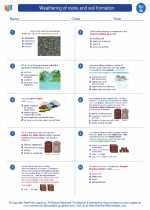Weathering of rocks and soil formation -> materials science
Materials Science
Materials science is a field that focuses on the study of materials and their properties. It encompasses the discovery, design, and application of materials, including metals, ceramics, polymers, and composites. This interdisciplinary field combines principles from physics, chemistry, engineering, and biology to understand and manipulate the properties of materials for various applications.
Key Concepts
- Properties of Materials: Understand the various properties of materials, including mechanical, thermal, electrical, and magnetic properties.
- Structure-Property Relationships: Learn about the relationship between the atomic or molecular structure of a material and its macroscopic properties.
- Material Classes: Explore different classes of materials, such as metals, ceramics, polymers, and composites, and their unique characteristics.
- Material Processing: Study the methods used to process and manufacture materials, including casting, forging, welding, and additive manufacturing.
- Material Characterization: Understand the techniques used to analyze and evaluate the properties of materials, such as microscopy, spectroscopy, and mechanical testing.
- Applications: Explore the wide range of applications of materials in various fields, including electronics, aerospace, biomedical, and energy.
Study Guide
To effectively study materials science, consider the following key points:
- Understand the fundamental properties of materials, including their mechanical, thermal, electrical, and magnetic properties.
- Explore the structure-property relationships to comprehend how the atomic or molecular structure influences the macroscopic properties of materials.
- Learn about the different classes of materials, such as metals, ceramics, polymers, and composites, and their unique characteristics and applications.
- Study the various methods used to process and manufacture materials, including casting, forging, welding, and additive manufacturing.
- Familiarize yourself with the techniques used to analyze and evaluate the properties of materials, such as microscopy, spectroscopy, and mechanical testing.
- Explore the diverse applications of materials in fields such as electronics, aerospace, biomedical, and energy to understand the real-world relevance of materials science.
By mastering these key concepts and study guide points, you can develop a strong foundation in materials science and its applications in various industries.
.◂Science Worksheets and Study Guides Seventh Grade. Weathering of rocks and soil formation
Study Guide Weathering of rocks and soil formation
Weathering of rocks and soil formation  Activity Lesson
Activity Lesson Weathering of Rocks
Weathering of Rocks  Worksheet/Answer key
Worksheet/Answer key Weathering of rocks and soil formation
Weathering of rocks and soil formation  Worksheet/Answer key
Worksheet/Answer key Weathering of rocks and soil formation
Weathering of rocks and soil formation  Worksheet/Answer key
Worksheet/Answer key Weathering of rocks and soil formation
Weathering of rocks and soil formation  Worksheet/Answer key
Worksheet/Answer key Weathering of rocks and soil formation
Weathering of rocks and soil formation  Vocabulary/Answer key
Vocabulary/Answer key Weathering of rocks and soil formation
Weathering of rocks and soil formation  Vocabulary/Answer key
Vocabulary/Answer key Weathering of rocks and soil formation
Weathering of rocks and soil formation  Vocabulary/Answer key
Vocabulary/Answer key Weathering of rocks and soil formation
Weathering of rocks and soil formation  Vocabulary/Answer key
Vocabulary/Answer key Weathering of rocks and soil formation
Weathering of rocks and soil formation 

 Activity Lesson
Activity Lesson
 Worksheet/Answer key
Worksheet/Answer key
 Worksheet/Answer key
Worksheet/Answer key
 Worksheet/Answer key
Worksheet/Answer key
 Worksheet/Answer key
Worksheet/Answer key
 Vocabulary/Answer key
Vocabulary/Answer key
 Vocabulary/Answer key
Vocabulary/Answer key
 Vocabulary/Answer key
Vocabulary/Answer key
 Vocabulary/Answer key
Vocabulary/Answer key

The resources above cover the following skills:
LIFE SCIENCE
Unity and Diversity
Analyze and interpret data for patterns of change in anatomical structures of organisms using the fossil record and the chronological order of fossil appearance in rock layers.